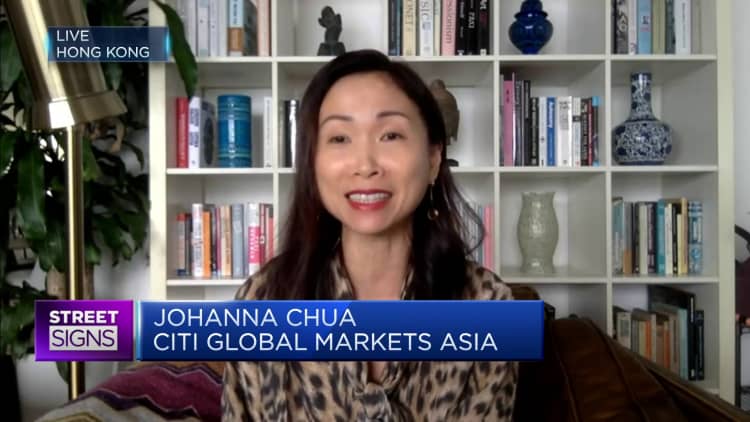
SINGAPORE — Shares in China led gains in mixed Asia-Pacific trading on Wednesday following the release of better-than-expected Chinese economic data.
The Shanghai Composite in mainland China climbed 0.5% to close at 3,305.41 while the Shenzhen Component advanced 0.948% to 12,137.76.
Hong Kong's Hang Seng index rose 1.14% to close at 21,308.21, as shares of Alibaba jumped 4.35%.
Shares of Prada in Hong Kong, however, declined 1.5% in Wednesday trade after an Oliver Wyman survey showed luxury brands slashing expectations for their China business this year following the country's latest Covid lockdowns.
Bets are also mounting that July FOMC will deliver another 75bp hike ... It appears 75 is the new 50.Vishnu Varathanhead of economics and strategy, Mizuho Bank
China's industrial output climbed 0.7% in May as compared with a year earlier, official data showed Wednesday, rising from the April's 2.9% decline. The reading for May came in above expectations by analysts in a Reuters poll for a 0.7% drop.
Meanwhile, retail sales in May fell 6.7% year-on-year, better than the expected 7.1% fall predicted by analysts in a Reuters poll.
"I think this data really kind of reinforces the view that Citi has had ... that … maybe we're already at peak growth pessimism in China," said Johanna Chua, head of Asia economics and strategy at Citi Global Markets Asia.
The Chinese industrial production data for May was a "big surprise," she said.
"We were expecting a 1.1% contraction [year-on-year]. So the fact that we've had a positive number perhaps still suggests that production side of China's economy was not really as disrupted by Covid and China continues to remain you know fairly strong in terms of the manufacturing side," Chua said.
Elsewhere in Asia-Pacific, the Nikkei 225 in Japan slipped 1.14% on the day to 26,326.16 while the Topix index dipped 1.2% to 1,855.93. South Korea's Kospi fell 1.83% to 2,447.38.
The S&P/ASX 200 in Australia declined 1.27%, ending the trading day at 6,601. MSCI's broadest index of Asia-Pacific shares outside Japan sat less than 0.1% lower.
Overnight on Wall Street, the S&P 500 fell deeper into bear market territory, declining 0.38% to 3,735.48. The Dow Jones Industrial Average shed 151.91 points, or 0.5%, to 30,364.83. The tech-heavy Nasdaq Composite outperformed, rising 0.18% to around 10,828.35.
The moves stateside came as U.S. Treasury yields rose again as investors anticipate more aggressive tightening policies from the Federal Reserve, which is set to announce its latest interest rate decision later Wednesday stateside.
Markets are "convinced" that the Fed will hike rates by 75 basis points at the June FOMC meeting, Mizuho Bank's Vishnu Varathan said in a note.
The market is betting on a more than 95% chance of a 75-basis-point rate hike, the biggest increase since 1994, according to the CME Group's FedWatch tool. 1 basis point equals 0.01%.
"Bets are also mounting that July FOMC will deliver another 75bp hike," said Vishnu, head of economics and strategy at the firm. "It appears 75 is the new 50."
Wharton professor Jeremy Siegel told CNBC's "Squawk Box Asia" that the market would be disappointed if the Fed only hiked rates by 50 basis points, deeming the central bank as being unaggressive in reining in inflation.
"The Fed needs to grab the narrative of inflation .. they know it is way too late. We got to go forceful right now," said the finance professor at the Wharton School at the University of Pennsylvania.
The benchmark 10-year Treasury yield last stood at 3.4291% — down from 3.48%, an 11-year high it reached on Tuesday. The 2-year rate was at 3.3648%. Yields move inversely to prices. The 2-year and 10-year Treasury yield curve briefly inverted earlier this week as investors position for potentially aggressive monetary policy tightening to tame inflation.
The yield curve inversion is closely monitored by traders and is often viewed as an indicator of potential recession ahead.
Currencies and oil
The U.S. dollar index, which tracks the greenback against a basket of its peers, was at 104.989 after seeing an earlier high of 105.385.
The Japanese yen traded at 134.70 per dollar, stronger as compared with an earlier low of 135.58 seen against the greenback. The Australian dollar changed hands at $0.6904, struggling to recover after last week's fall from levels above $0.72.
Oil prices were higher in the afternoon of Asia trading hours, with international benchmark Brent crude futures up 0.16% to $121.36 per barrel. U.S. crude futures also rose 0.08% to $119.02 per barrel.


